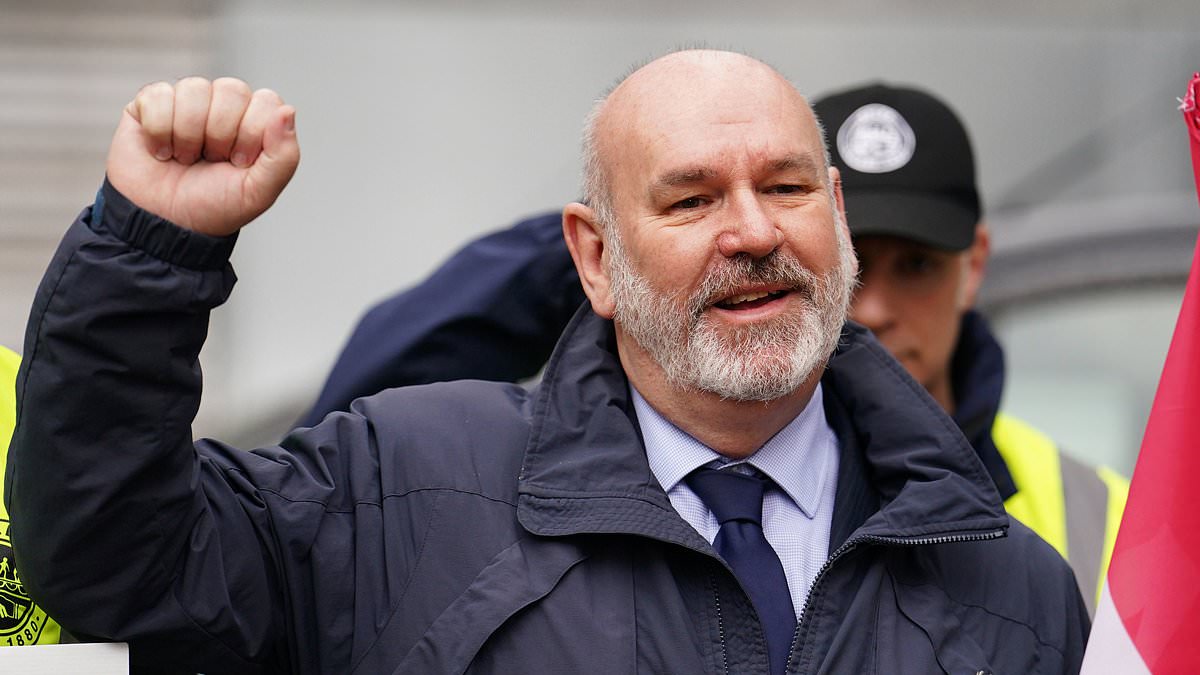From the right to restart a break if your manager says hi, to paid time off if you use a microwave – a series of bizarre ‘Spanish practices’ on the railways have emerged.
Others include getting extra time on breaks to walk to and from the mess room, and how menial tasks such as changing a plug socket can take nine workers.
Now, under the new Government’s offer to end the two-year rail strikes, train drivers will keep the bizarre perks that the previous Tory government wanted to ditch.
Ministers said on Wednesday that they had struck a deal with union chiefs which would see the average driver’s salary soar by 14.25 per cent to about £69,000.
The pay rise, which is pensionable, could cost as much as £100million. It is more generous than the previous government’s offer of 8 per cent over two years.
This also included conditions around reforming antiquated and costly working rules, dubbed ‘Spanish practices’, that the Tory administration wanted, and which would have reduced the cost of running the railways. These practices include the following:
SAYING NO TO SUNDAYS
BAN ON DIGITAL DEVICES
ENDLESS MEDICAL CHECKS
DOUBLING UP WORKERS
WALKING ALLOWANCES
EXTENDING A BREAK
MANUAL MAINTENANCE
The new offer comprised a 5 per cent hike for 2022/23, 4.75 per cent for 23/24 and 4.5 per cent for 24/25.
Yesterday, however, Education Secretary Bridget Phillipson struggled to explain how the deal for drivers – who work a four-day week – would be funded.
While the offer came as a relief to passengers plagued by strikes, Labour was accused of surrendering to its union ‘paymasters’ because it comes with no strings attached.
The previous Tory administration insisted reforms, such as compulsory Sunday working, had to be part of any agreement.
But the offer is even more generous than first thought, as it also covers drivers who have left their jobs in the last two years.
This is because the 14 per cent salary hike covers three years, backdating to April 2022.
Around 1,000 train drivers leave their jobs every year, according to industry figures.
This means as many as 2,000 who are now retired or have moved jobs could be in line for a taxpayer-funded windfall.
Former Tory leader Sir Iain Duncan Smith said: ‘Labour is throwing money at its union paymasters like confetti.
‘The unions have said, ‘We’ve put up with 14 years of Tory government, now we want payback for all the times we supported you’.
‘And it’s not going to stop there. Once you give in to one or two on such a grand scale, everybody else feels like it’s Christmas. And taxes will have to rise to cover it all.’
Former transport secretary Grant Shapps criticised the fact that no reforms to working practices were demanded in return for the pay hike, adding: ‘If there are no real productivity improvements then this deal with your union paymasters will add to inflation, fail to modernise rail services and let down passengers.’
Yesterday the Education Secretary was asked ‘who will pay’ five times by host Justin Webb during an interview on BBC Radio 4’s Today programme.
He said: ‘It must come, mustn’t it, either from the Department for Transport budget – so from other aspects of the transport infrastructure – or from taxpayers or farepayers?’
Ms Phillipson replied: ‘Overall, we are intending to deliver a big reform of the rail network. This is part of the wider reform that we will be delivering across our railways to make sure we get a better deal for passengers.’
Transport Secretary Louise Haigh yesterday defended the deal. She said: ‘I promised to move fast and fix things. That’s why we’ve agreed a deal with [the Aslef union] which – if members agree – will put an end to the rail strikes after two long years.’
Yesterday Aslef boss Mick Whelan admitted the union got the offer without giving anything in return.
The union will put it to 13,000 members in a ballot, and it has recommended they accept.
It comes after the new Labour Government signed off a 5.5 per cent pay increase for most other public sector workers – estimated to cost taxpayers £9.4billion.
It came as Tory transport spokesman Helen Whately wrote to Ms Haigh: ‘This substantial ‘no strings’ deal looks like it will mean higher costs for the taxpayer or farepayer. It is understandable that [they] will be concerned the costs will fall on their shoulders.’
A Department for Transport spokesman said: ‘Train drivers have not had a pay rise for five years.
‘This offer costs significantly less than the economic damage strikes have caused over the previous two years. That’s not to mention the impact it has had on hardworking people’s day to day lives.
‘This Government is doing the right thing by ending strikes and returning a much needed certainty for passengers across the country.’
